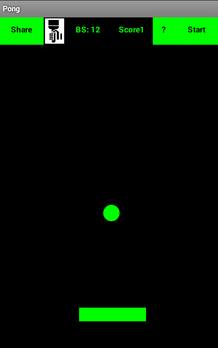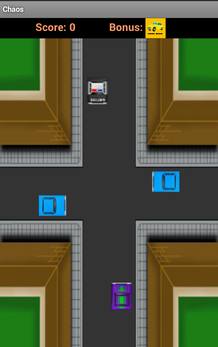Few days ago, I have read a very important news for Education in Spain: “Next year, student of Secondary, in Madrid, will have to study a subject for learning to program”.
Pong is the name of one of the video game, in which has been working a student of fourth course of ESO, in IES Humanes (Madrid). Unknowingly, he had changed, from a tutorial and their own imagination, a comparison of Arkanoid, known arcade from 80s.

Pong: a similar game to Arkanoid
In this elective subject, in the bilingual Institute, 14 students are learning to program with the App Inventor platform. It is a tool, for creating mobile applications, for the Android operating system, initiated by the MIT and now owned by Google Labs.
Their teacher, Ana Viejo, said that it is the first time, that these students make contact with programming and they began developing, almost by accident, as a complement to the subject.
The teacher showed the students the development platform and tutorials, available in English, and they began to learn on their own, with the support of their teacher, although most of the work are really performed by the students, themselves in their homes.
The same student, who created the replica of Arkanoid, has invented, from zero, a new game,”Chaos”, in which, the user has to prevent cars collide at an intersection. "They have a lot of interest and accept, very well, the suggestions and corrections", stressed Viejo.

Chaos: an original game
The IES Humanes is a pilot experience, for the next school year; it is expected that a new compulsory subject Programming is taught in all courses of ESO of the Community of Madrid, replacing the previous field of technology, as explained the General Manager of Improvement of Teaching Quality, Pablo Hispan.
In this sense, the Professor, of IES Humanes, commented that she hopes the resources are sufficient during 2015-2016, as Internet connections, more powerful, and there is equipment for all students.
In the new subject of ESO, students will learn, among others, to use App Inventor and Scratch, another graphic environment of open code of the MIT, to learn programming block. They will also work with the free hardware board, “Arduino”.
In 2014, more than 1,100 teachers, from public and private educational, received 40 hours of training, through a platform offered by Telefónica, called Codemadrid, and, soon, will be taught Arduino development classes.
"The program helps students, who are not just consumers of digital products. The key of the XXI century is being a digital creator, it can not happen to invent others", he emphasized Hispan, who has indicated that there is a budget of 16 million euros to introduce the subject.
In this course, the 15 technology institutes in the Community have already begun to teach 'Programming and Communications', as an optional subject, in 4th year of ESO. This is applied in the Institute of Technology of Getafe, Satafi, in which 17 students --of which, 14 are girls and three boys-- receive two hours of class, a week.
The Professor, Elena Ribón, has commented that, currently, they are learning to develop videogames, as this allows them to think what to do characters, interacting with them and work together. "Learning is pretty self", stressed the teacher, since are the students themselves, who have to investigate, think and share knowledge, with other colleagues.
However, Ribón has noted that she is advocate that Technology keeps in ESO 1: "It is a more complete course, includes not only digital contents; a nail and a hammer are also technology".
In Catalonia, skills in programming began to incorporate in the last year. Some 6,000 secondary students --a 20% of the region-- received training development, in the optional subject of Informatic. In the practical part, they received notions, to program applications, for mobile devices.
This practice is part of a program called “mSchools” --driven by Catalan public institutions and the GSMA company--, that promotes the introduction of mobile technology in the classroom.
Other communities have also begun to take steps to extend knowledge of programming.
In Castilla-La Mancha, inspired by the global movement of the Time Code (Hour of Code, which seeks to teach programming from four years), the High School of Computing of Ciudad Real has spent three years teaching an introductory course of three hours, at institutes in the region.
Its main driver, from the Department of Technology and Information Systems of the University of Castilla-La Mancha, Carlos González Morcillo, thinks that knowing how to program "is as important as knowing how to speak or have a mathematical thinking".
In this sense, he thinks that, because development requires logical thinking way, it also helps solve problems, in other areas. "It furnish well head and I have, very clear, that it is the way, like learning language, mathematics or physical education", has ruled.
Another example is Andalusia, which, although has no specific subject, dedicated to program, in sixth grade of Primary, there is an area called 'Culture and digital practice', in which students are introduced to the proper use of applications, for phones and tablets; to function in online learning environments, etc.

Students with tablets
For its part, the educational curriculum, for Secondary Education and A Level, published in the BOE this January, integrates the knowledge and use of computer applications, in multiple subjects –in transversal form-- and in specific areas, that the regions will have to adapt these months.
In Spain, in recent years have been escalating degrees of computer development of public and private higher education. The pioneering universities, now almost eleven years ago, were the University Pompeu Fabra and the University Complutense of Madrid.
The director of the Masters in Game Development UCM, Pedro González, said that starting to teach programming in secondary "can lay the foundation for approaching the technology with more confidence".
He also thinks that the development instills a "systematic way to deal with the complexity", since solving problems of programming, you must use a highly structured instructions.
González also thinks that learning programming is one way to change the production model. "The creative industries contribute to very big bonus, since they go to international markets. In Spain, we are creative, we have a good technical level", he finished.
Well, I hope that Spanish students make the most of this opportunity of learning to program.
Until my next post, kind regards,
Luis.
Sponsored by Costaluz Lawyers.
Please click below:
